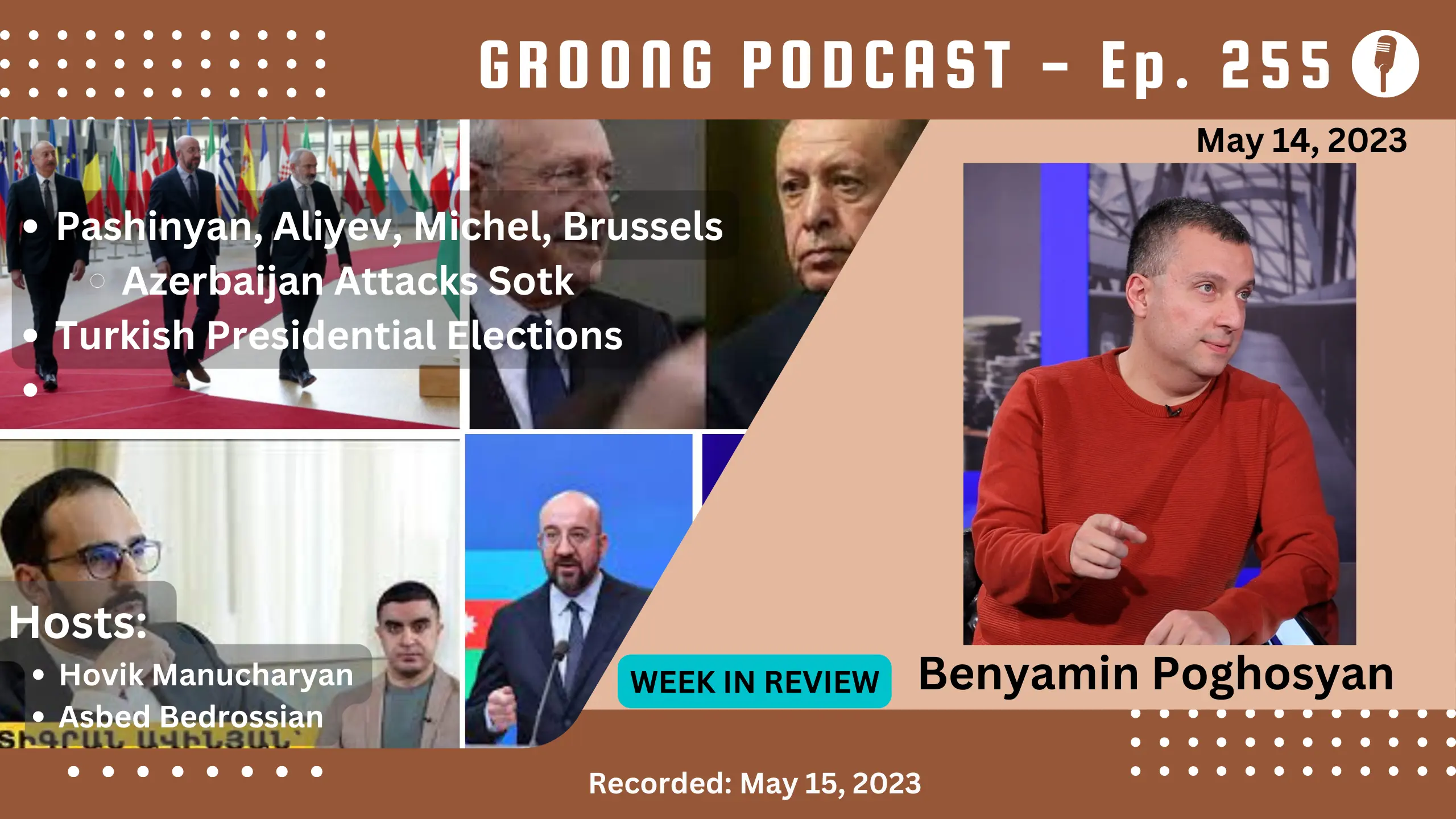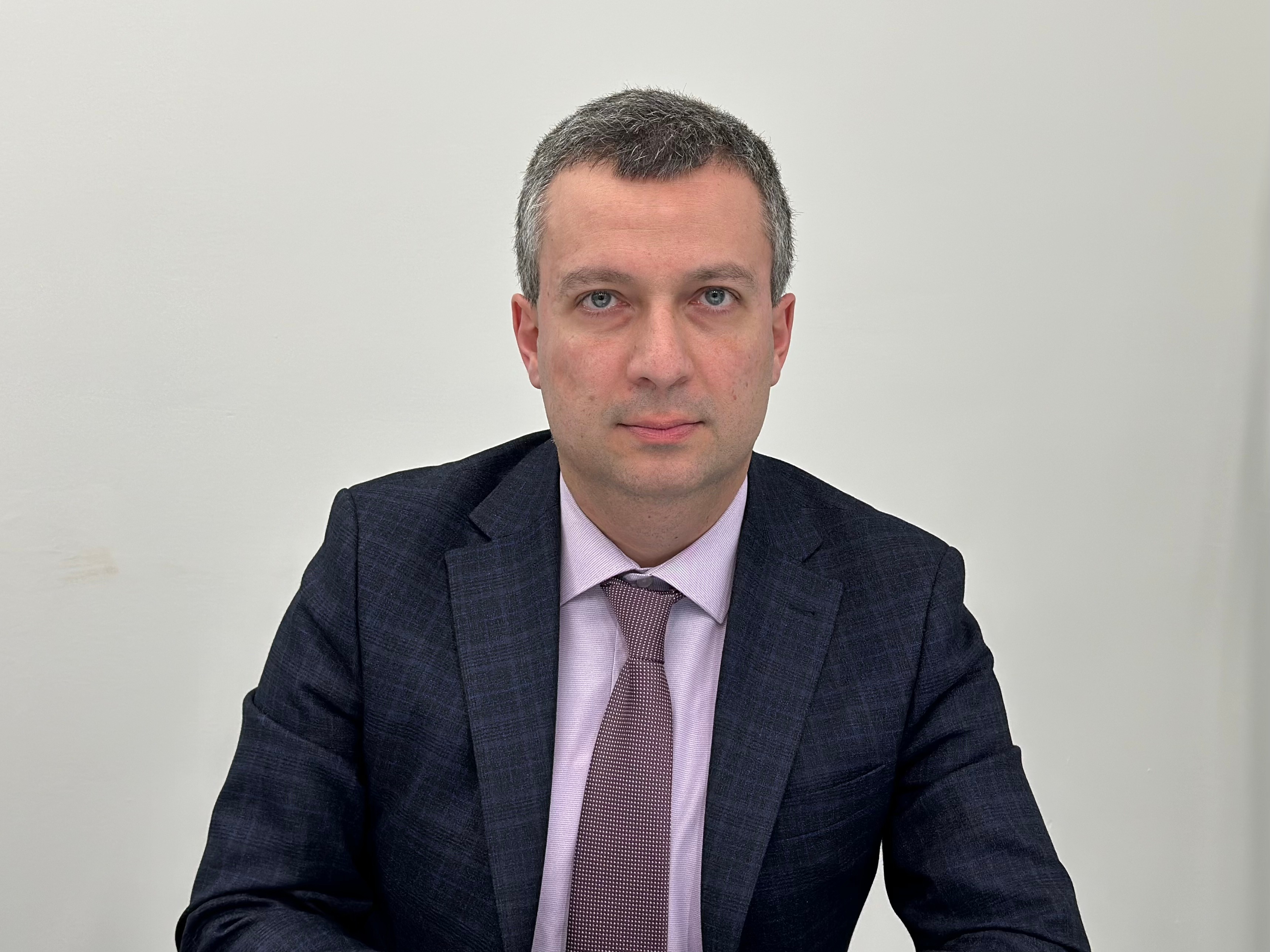
Guest:
Topic:
- Pashinyan, Aliyev, Michel Meet in Brussels
- Azerbaijan Attacks Sotk
- Turkish Presidential Elections
Episode 255 | Recorded: May 15, 2023
Show Notes
In Brussels Pashinyan Recognizes Artsakh as Azerbaijan?
This week we saw more fighting in Armenia resulting in six wounded and a death, shortly before an unfazed Pashinyan attended the summit in Brussels with Aliyev and Charles Michel and apparently declared recognition of an Azerbaijan with 86,600 sq kms, which many analysts say includes Artsakh.
Former foreign minister Vardan Oskanian reacted by saying that Pashinyan’s “hand must be restrained now, it will be too late tomorrow”. Meanwhile, former foreign minister of Artsakh David Babayan called the announcement out of Brussels as disgusting, putrid, and criminal.
Fighting Several Days Before
Days before the awaited meeting in Brussels a two-day battle began in Gegharkunik. Sotk, Norabak, Verin Shorzha were attacked with high-caliber weapons, including mortar and artillery. The Armenian side had 4 wounded on the first day and two wounded on the second day. Unfortunately on day 2 we also had a death.
Pashinyan said that Azerbaijan’s attack is an attempt “to nullify the progress that was recorded during the negotiations that took place in Washington on May 1-4.”
He also indicated that his plans to go to Brussels had not changed.
Questions:
- What was the cause?
- Was it about the gold mine?
- Was it to affect negotiations?
- Again, where are the EU observers?
- EU observers decided to start driving to the location 8 hours later.
Charles Michel Announcement
After the summit, Michel said that the sides were closer than ever. One of the key points was the mutual recognition of “territorial integrity of Armenia (29,800 km2) and Azerbaijan (86,600 km2).”
Until now, those wishing to give Pashinyan the benefit of the doubt, said that Pashinyan is playing 4D chess and by avoiding explicit mention of Artsakh as part of Azerbaijan, he was leaving some wiggle room for interpretation of the final status of Artsakh. And we heard Aliyev a few weeks ago say that Pashinyan must explicitly say that “Artsakh is Azerbaijan”.
Well, isn’t specifying the exact surface area of Azerbaijan, essentially saying that Artsakh is Azerbaijan?
Questions:
- What are the implications of this statement for the status of Artsakh, for the so-called enclaves?
Michel’s announcement also included the withdrawal of forces on both sides.
Question:
- Is this Pashinyan’s mirrored withdrawal idea? Azerbaijanis are already in Armenia. Where is Armenia going to withdraw to?
- Do you believe that signing a so-called “peace treaty” is close?
Elections in Turkey
Yesterday was May 14, the big presidential election day in Turkey. There is a real potential for change in Turkey, as the political opposition, mostly united behind CHP leader Kemal Kiliçdaroglu, has mounted a credible alternative to incumbent president, AKP’s Reçep Erdogan, after decades of his single-party rule by a strong executive. This election is also watched internationally because of Turkey’s expansionist agenda under Erdogan and the warm personal relationship between Erdogan and Putin, which has translated to some benefit for Russia during the war on Ukraine, specifically in evading some western sanctions.
Some issues concerning the South Caucasus and Armenia have been mentioned in this campaign, though probably not as one of the top 10 issues. For instance, Kilicdaroglu said that his vision for connecting Turkey with China does not include a corridor that would go through Syunik, Artsakh, and Azerbaijan. Instead, he talked about a corridor through Iran. Cavusoglu was quick to respond to the Kilicdaroglu campaign, saying: “There will be a Zangezur corridor.”
Azerbaijan, which has seen great support from Turkey during Erdogan’s rule, also spoke out. Foreign minister Bayramov said: “Without Azerbaijan, there can’t be a Turkish road. The Turkish world will be united through Zangezur corridor”
At the time of our recording this show, it appears that Erdogan has mustered 49.5% of the vote to Kiliçdaroglu’s 44.9%, and as the winner needs to take over 50% of the vote, it’s very likely that a runoff election will be scheduled on May 28, between the two leaders,
Questions:
- Outside of campaign announcements, how big of an impact on Turkey’s foreign policy would a Kilicdaroglu victory have?
- The West is heavily invested in its war against Russia in Ukraine. Would a change of presidency in Turkey greatly affect the war in Ukraine? Does the West have a preference as to who wins this election?
- What difference would it make for Armenia, whether there’s a Kiliçdaroglu administration, or a continuing Erdogan administration?
- Is there a potential for domestic unrest in Turkey due to the electoral outcome? What should Armenia, and probably all others anticipate, or prepare for?
Wrap-up
We hope you found our Week in Review helpful. We invite your feedback and your suggestions, you can find us on most social media and podcast platforms. Thanks to Laura Osborn for the music on our podcasts.
Guests

Benyamin Poghosyan
Dr. Benyamin Poghosyan is a Senior Research Fellow at APRI Armenia, a Yerevan based think tank,and the Chairman of the Center for Political and Economic Strategic Studies. He has served as the vice president for research and head of the Institute for National Strategic Studies at the National Defense Research University in Armenia. Dr. Poghosyan was a Distinguished Research Fellow at the US National Defense University College of International Security Affairs. He is a graduate from the US State Department Study of the US Institutes for Scholars 2012 Program on US National Security Policy Making. He holds a PhD in history and is a graduate from the 2006 Tavitian Program on International Relations at Fletcher School of Law and Diplomacy.
Hosts

Hovik Manucharyan
Hovik Manucharyan is an information security engineer who moved from Seattle to Armenia in 2022. He co-founded the ANN/Groong podcast in 2020 and has been a contributor to Groong News since the late 1990s.
Disclaimer: The views expressed by Hovik Manucharyan on the ANN/Groong podcast are his own and do not necessarily reflect the opinions of his employer or any other organization.

Asbed Bedrossian
Asbed Bedrossian is an IT professional, and for years oversaw the central IT enterprise infrastructure and services at USC. His decades of experience spanned across IT strategy, enterprise architecture, infrastructure, cybersecurity, enterprise applications, data center operations, high performance computing, ITSM, ITPM, and more.
Asbed founded the Armenian News Network Groong circa 1989/1990, and co-founded the ANN/Groong podcast in 2020.